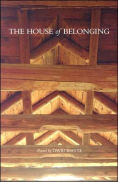I came to Whyte’s poetry, somewhat to my surprise, through his writings about work, about how even seemingly mundane work can be a pilgrimage. I’m interested in that moment when work ceases to be just a job and becomes, in spite of all our kvetching, something that gives meaning to our lives, something that we can invest with our sense of ourselves. Easy enough to do when it’s poetry, but what about when it is selling perfume or delivering mail?
The poems in this book are different from those to which I’m usually drawn. At first glance they don’t even seem to be poems—aside from the line breaks—but rather the sort of heart-to-heart you have with an old friend late at night over a cup of tea or glass of whisky. Yet within the plain speaking is a core of light. Here’s the beginning of “What to Remember When Waking”:
In that first
hardly noticed
moment
in which you wake,
coming back
to this life
from the other
more secret,
moveable
and frighteningly
honest
world
where everything
began,
there is a small
opening
into the day
which closes
the moment
you begin
your plans.
The short lines make it feel as though he is groping his way, slowly, towards something that will turn out to be important. As the poem continues, the tone veers away from the informal and becomes that of a guru delivering wisdom before ending in questions. It’s an interesting sequence and representative of the poems here.
There is wisdom, and surprise. And the tentative groping, the occasional sermon, the questions give power to the insight that emerges.
These are what Ron Padgett calls “transparent” poems. As Leslie Ullman describes in “Press Send: Risk, Intuition, and the Transparent Poem” (The Writer’s Chronicle, Vol 48, No 4, February 2016), “By ‘transparent’ Padgett was referring to use of language that does not depend on form, sound-work, metaphor, condensation, or complexity of thought.” In other words, setting aside all those things that I particularly love about poetry in favor of straightforward language.
And yet there have been plenty of poems I’ve loved that would qualify as transparent poems, some of them in this collection. There are poems here about the night, about friendship and solitude that I will come back to again and again.
What makes them work? Ullman says, “. . . the transparent poem can be disarming, conversational, and to a degree easy to grasp in one sitting, but rich with implications and reverberations that expand during subsequent readings . . .The transparent poem takes what it [sic] is at hand, which more often than not is the accessible stuff of quotidian life, and makes it fresh. Pushes it a little beyond its expected territory.”
Such poems may look easy, but must require great patience to revise and revise again in order to craft something so seemingly inconsequential into a work invested with such meaning. And I am reminded that even those jobs we take up thinking to earn enough to survive while holding our true selves aloof, even the least of them can accept all that we can bring. It is what we bring that matters, the challenge and the risk.
What is one of your favorite poems? What about it appeals to you?


I have been making a search for one of David Whyte’s poems on Iona: Some images that come to mind “the air is so thin that separates Iona from the continent of Europe. He also talked of “field of frozen death.” Where can I find the poem. What is its name?
I don’t know, Richard. Perhaps someone else will chime in.